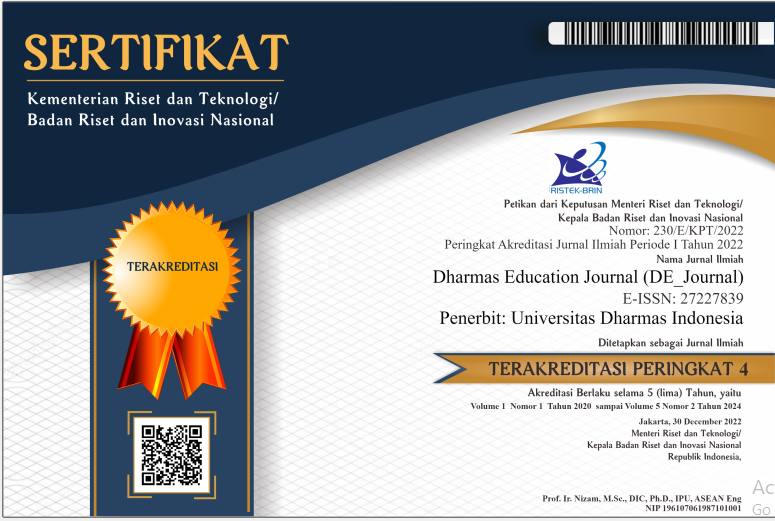ANALISIS KEMAMPUAN BERPIKIR KRITIS SISWA KELAS XI DALAM MENYELESAIKAN SOAL LOGARITMA DITINJAU DARI PRESTASI BELAJAR
DOI:
https://doi.org/10.56667/dejournal.v1i2.128Keywords:
Critical Thinking, Logarithmic, Learning AchievementAbstract
This study aims to analyze students' critical thinking skills in solving logarithmic questions in terms of learning achievement. The research subjects were students of class XI SMA Negeri 1 Mojolaban. Critical thinking skills are abilities that require students to be able to interpret, analyze, evaluate, and provide decisions or conclusions. Research is focused on critical thinking skills in solving Logarithmic problems. This study uses a qualitative approach with data collection techniques. Student achievement data were obtained from the Final Semester Assessment (PAS) document. Meanwhile, the data on students' critical thinking skills were obtained through tests. Critical thinking does not see the final result but the process carried out by students, how to interpret the questions until the decisions or conclusions are obtained. Based on the results of the study, the data obtained from the analysis of students' critical thinking skills on logarithmic material showed that 8 students were categorized as very high critical thinking skills, 10 students were categorized as high critical thinking skills, 2 students were categorized as moderate critical thinking skills, 5 students included the category of students with low critical thinking skills, and 5 students including the category of students with very low critical thinking skills.
Downloads
References
Basrowi & Suwandi. (2014). dalam Penelitian Pendidikan Bahasa. 信阳师范学院, 1(1), 32. http://e-journal.usd.ac.id/index.php/LLT%0Ahttp://jurnal.untan.ac.id/index.php/jpdpb/article/viewFile/11345/10753%0Ahttp://dx.doi.org/10.1016/j.sbspro.2015.04.758%0Awww.iosrjournals.org
Cahyo, R. (2010). Faktor-faktor Mempengaruhi Prestasi Belajar Kewirausahaan Siswa Kelas XI SMK N I Punggelan Banjarnegara. Skripsi, 1–102.
Dewi, L., Ahied, M., Rosidi, I., & Munawaroh, F. (2019). Jurnal pendidikan matematika dan ipa. 10(2), 301.
Flora Siagian, R. E. (2015). Pengaruh Minat dan Kebiasaan Belajar Siswa terhadap Prestasi Belajar Matematika. Formatif: Jurnal Ilmiah Pendidikan MIPA, 2(2), 122–131. https://doi.org/10.30998/formatif.v2i2.93
Hamdu, G., & Agustina, L. (2011). PENGARUH MOTIVASI BELAJAR SISWA TERHADAP PESTASI BELAJAR IPA DI SEKOLAH DASAR (Studi Kasus terhadap Siswa Kelas IV SDN Tarumanagara Kecamatan Tawang Kota Tasikmalaya). Jurnal Penelitian Pendidikan, 12(Motivasi belajar IPA pada siswa SD), 81. https://scholar.google.com/scholar?hl=id&as_sdt=0%2C5&q=jurnal+penelitian+ipa&oq=#=gs_qabs&u=%23p%3D3OVZRkhFVKUJ
Hapnita, W., Abdullah, R., Gusmareta, Y., & Rizal, F. (2018). Faktor Internal Dan Eksternal Yang Dominan Mempengaruhi Hasil Belajar Menggambar Dengan Perangkat Lunak Siswa Kelas XI Teknik Gambar Bangunan SMK N 1 Padang Tahun 2016/2017. CIVED (Journal of Civil
Engineering and Vocational Education), 5(1). https://doi.org/10.24036/cived.v5i1.9941
Juminah. (2016). Pengaruh Task Commitment dan Locus of Control Terhadap Prestasi Belajar Matematika. Jkmp, 02(01), 45. http://lppmunidra.ac.id
Kurniawati, R. (2013). Meningkatkan Kemampuan Berpikir Ktitis Matematik Siswa SMA Melalui Model Pembelajaran Missouri Mathematics Project (MMP). 8-15. Repository.upi.edu a-research.upi.edu/operator/upload/s_mat_0807552_chapter_ii.pdf
Leonard, & Amanah, N. (2014). ADVERSIry QUOTIENTAND CRITICAT TI { INIONG ABILITY. Perspektif Ilmu Pendidikan, 28(1), 55–64.
Maryanti, wiwin eni. (2018). 済無No Title No Title. E-Conversion - Proposal for a Cluster of Excellence.
Rahmawati, F., Pamungkas, M., Ardiyanto, B., Fadhilatullathifi, Z., Gunawan, & Safitri, D. (2020). Identification of student's misconceptions in chemical bonding topic using fout-tier diagnostic test. Journal of Physics: Conference Series, 1521(4), 114–124. https://doi.org/10.1088/1742-6596/1521/4/042059
Sabirin, M. (2014). Representasi Dalam Pembelajaran Matematike. Jurnal Pendidikan Matematika, 1(2), 33–44.
Sahrudin, A. (2014). Implementasi strategi Pembelajaran Discovery untuk Meningkatkan Kemampuan Pemecahan Masalah Matematis dan Motivasi Belajar Siswa SMA. Jurnal Pendidikan Unsika, 2(1), 1-12.
Setyowati, A., & Subali, B. (2011). Implementasi Pendekatan Konflik Kognitif Dalam Pembelajaran Fisika Untuk Menumbuhkan Kemampuan Berpikir Kritis Siswa Smp Kelas Viii. Jurnal Pendidikan Fisika Indonesia, 7(2), 89–96. https://doi.org/10.15294/jpfi.v7i2.1078
Sintya Devi, P., & Wira Bayu, G. (2020). id 2 Berpikir Kritis dan Hasil Belajar IPA Melalui Pembelajaran Problem Based Learning Berbantuan Media Visual. MIMBAR PGSD Undiksha, 8(2), 238–252. https://ejournal.undiksha.ac.id/index.php/JJPGSD/article/view/26525
Suhartini, S., & Martyanti, A. (2007). Meningkatkan Kemampuan Berpikir Kritis pada Pembelajaran Geometri Berbasis Etnomatematika. Jurnal Gantang, 2(2), 105-111. https:doi.org/10.31629/jgv2i2.198
Syafi’i, A., Marfiyanto, T., & Rodiyah, S. K. (2018). Studi Tentang Prestasi Belajar Siswa Dalam Berbagai Aspek Dan Faktor Yang Mempengaruhi. Jurnal Komunikasi Pendidikan, 2(2), 115. https://doi.org/10.32585/jkp.v2i2.114
Downloads
Published
How to Cite
Issue
Section
License
Copyright (c) 2020 DE_JOURNAL (Dharmas Education Journal)

This work is licensed under a Creative Commons Attribution-NonCommercial-NoDerivatives 4.0 International License.
Makalah yang disampaikan diasumsikan tidak mengandung bahan propietary yang tidak dilindungi oleh hak paten















